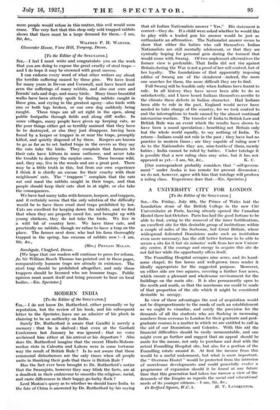A UNIVERSITY CITY FOR LONDON [To the Editor of the
SPECTATOR.]
SIR,—On Friday, July 8th, the Prince of Wales laid the foundation stone of the British College in the new Cite Universitaire at Paris, having already opened the Canadian Hostel there last October. Paris has had the good fortune to be able to find, owing to the removal of the inner fortifications, an excellent site for this desirable group of institutions within a couple of miles of the Sorbonne, but Great Britain, whose widespread federated Dominions make such an institution even more necessary, has the still better fortune to be able to secure a site for it but six minutes' walk from her new Univer- sity centre, if the courage and energy to acquire this site do not fail her while the opportunity offers itself.
The Foundling Hospital occupies nine acres, and its hand- some chapel, its fine lawns and well-grown trees render it ideally appropriate for the suggested purpose. Moreover, on either side are two squares, covering a further four acres, which ensure a pleasant and wholesome environment for the buildings on the main site. It is also permanently open to the north and south, so that the maximum use could be made of that proportion of the site which it might be considered desirable to occupy.
In view of these advantages the cost of acquisition would not be disproportionate to the needs of such an establishment as we ought to visualize, and surely the provision for the demands of all the students who are flocking in increasing numbers from overseas to London for their graduate and post- graduate courses is a matter in which we are entitled to call in the aid of our Dominions and Colonies. With this aid the financial difficulties should be easily surmountable, and one might even go further and suggest that an appeal should be made for the means, not only to purchase and deal with the actual Foundling Hospital site, but also for a portion of the Foundling estate around it. At first the income from this would be a useful endowment, but what is more important, the " Overseas Hostel " would be protected from the intrusion of unwelcome developments and could peacefully evolve a programme of expansion should it be found at any future time that this generation had taken too narrow a view of the demands of the Empire as regards the social and educational needs of its younger citizens.—I am, Sir, &c.,










































 Previous page
Previous page